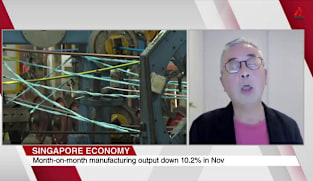Mark Lee on Child Development Co-Savings (Amendment) Bill
Proposed increases in paid paternity leave and unpaid infant care leave could pose significant challenges for certain businesses, said NMP Mark Lee in Parliament on Monday (Sep 18). These include small- and medium-sized enterprises (SMEs) with streamlined workforces, as well as industries that are oriented towards frontline service. To ensure that firms are not unfairly disadvantaged and to facilitate higher adoption of the new measures, Mr Lee made several suggestions. First, revise the reimbursement schedule for parental leave to avoid payments being delayed by up to a year if employees choose to spread their extra leave over time. SMEs could be allowed to make pro-rated filings more frequently, such as quarterly, to alleviate cashflow strain. Second, consider a tiered support structure to incentivise firms to voluntarily adopt the enhanced paternity leave arrangements. For example, giving smaller enterprises higher reimbursement rates or enhanced support through the Productivity Solutions Grant to help them adopt staffing and scheduling solutions. Third, create a consolidated pool of skilled workers that can be deployed swiftly and effectively to SMEs at short notice. The Government could offer initial funding to key players to pilot such initiatives. Finally, Mr Lee called for the establishment of a comprehensive framework to recognise companies that support national-level initiatives such as enhanced parental leave benefits and Progressive Wage Mark accreditation. This could be linked with practical economic incentives, such as the fulfilment of Government procurement terms or temporary enhancements to foreign worker access.
Proposed increases in paid paternity leave and unpaid infant care leave could pose significant challenges for certain businesses, said NMP Mark Lee in Parliament on Monday (Sep 18). These include small- and medium-sized enterprises (SMEs) with streamlined workforces, as well as industries that are oriented towards frontline service. To ensure that firms are not unfairly disadvantaged and to facilitate higher adoption of the new measures, Mr Lee made several suggestions. First, revise the reimbursement schedule for parental leave to avoid payments being delayed by up to a year if employees choose to spread their extra leave over time. SMEs could be allowed to make pro-rated filings more frequently, such as quarterly, to alleviate cashflow strain. Second, consider a tiered support structure to incentivise firms to voluntarily adopt the enhanced paternity leave arrangements. For example, giving smaller enterprises higher reimbursement rates or enhanced support through the Productivity Solutions Grant to help them adopt staffing and scheduling solutions. Third, create a consolidated pool of skilled workers that can be deployed swiftly and effectively to SMEs at short notice. The Government could offer initial funding to key players to pilot such initiatives. Finally, Mr Lee called for the establishment of a comprehensive framework to recognise companies that support national-level initiatives such as enhanced parental leave benefits and Progressive Wage Mark accreditation. This could be linked with practical economic incentives, such as the fulfilment of Government procurement terms or temporary enhancements to foreign worker access.



















